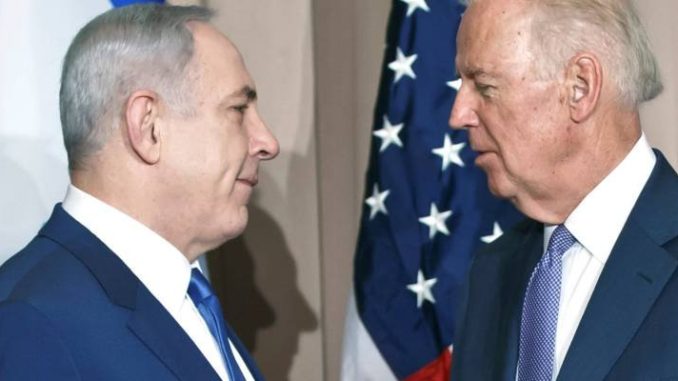
While the IDF estimates that Tehran is two years away from a nuclear weapon and Iranian terror proxy Hezbollah seeks to strike Israel, the Biden administration is on the cusp of removing sanctions.
By United with Israel Staff and AP
The Biden administration is considering a near wholesale rollback of some of the most stringent Trump-era sanctions imposed on Iran in a move that Israel and several other countries in the Middle East have warned will create imminent danger to U.S. allies.
The rollback was confirmed by current and former U.S. officials and others familiar with the matter.
As indirect talks continue this week in Vienna to explore the possibility of reviving the 2015 Iran nuclear deal, Biden administration officials have become increasingly expansive about what they might be prepared to offer Iran, which has demanded that all U.S. sanctions be removed.
In February, the IDF’s annual intelligence assessment revealed that Tehran is two years away from a nuclear weapon and the Iranian terror proxy Hezbollah seeks to strike Israel, Israeli news site N12 reported.
The IDF also documented that Iran has violated the 2015 nuclear agreement.
In 2018, Israeli Prime Minister Benjamin Netanyahu presented to the world a trove evidence that spies spirited out of Tehran proving the existence of Iran’s nuclear weapons program and the fact that it had never been completely abandoned, despite consistent denials from Tehran related to the program.
Meanwhile, Biden administration officials deny they will remove all non-nuclear sanctions, but have declined to identify those which they believe Trump improperly imposed on terrorism and other grounds.
“Any return to the JCPOA would require sanctions relief, but we are considering removing only those sanctions that are inconsistent with the JCPOA,” said State Department spokesman Ned Price. “Even if we rejoin the JCPOA — which remains a hypothetical — we would retain and continue to implement sanctions on Iran for activities not covered by the JCPOA, including Iran’s missile proliferation, support for terrorism, and human rights abuses.”
When President Donald Trump re-imposed sanctions after withdrawing from the deal in 2018, he not only put the nuclear sanctions back in but also added layers of terrorism and other sanctions on many of the same entities.
Iran remains the world’s top state sponsor of terrorism.
In addition, the Trump administration imposed an array of new sanctions on previously unsanctioned entities.
Iran is demanding the removal of all sanctions. If the U.S. doesn’t lift at least some of them, Iran says it won’t agree to halt its nuclear activities barred by the deal known as the Joint Comprehensive Plan of Action, or JCPOA.
But if the Biden administration makes concessions that go beyond the nuclear-specific sanctions, Republican critics and American allies, including Israel and Gulf Arab states, are likely to seize on them as proof that the administration is caving to Iran.
Former Secretary of State Mike Pompeo has led the charge among Trump alumni to denounce any easing of sanctions.
Former Trump administration officials say all the sanctions are legitimate. Gabriel Noronha, a former State Department senior adviser on Iran, said all the Trump-era sanctions had been approved by career Justice Department lawyers and would have been rejected if they weren’t legitimate.
But a senior State Department official involved in the negotiations said officials now “have to go through every sanction to look at whether they were legitimately or not legitimately imposed.”
Additional comments suggest that sanctions imposed on Iran’s Central Bank, its national oil and shipping companies, its manufacturing, construction and financial sectors are on the block. Deal critics briefed on aspects of the Vienna negotiations say they suspect that is indeed the case.
Critics of the nuclear deal fear the administration will go beyond even what has been suggested by the administration’s oblique comments. They suspect that sanctions on people, companies, government agencies or other entities identified for nuclear sanctions relief in the 2015 deal will be cleared; even if they were subsequently penalized on other grounds.
“The administration is looking to allow tens of billions of dollars into the coffers of the regime even if it means lifting sanctions on major entities blacklisted for terrorism and missile proliferation,” said Mark Dubowitz, a prominent Iran deal critic and CEO of the Foundation for Defense of Democracies.
“They’re even looking to give the regime indirect access to the U.S. dollar through the U.S. financial system so that international companies can clear transactions with Iran through the U.S. dollar,” said Dubowitz.
The Obama administration took the position that some sanctions previously imposed by it and former President George W. Bush’s administration for terrorism reasons should actually be classified as nuclear sanctions and therefore lifted under the deal.
Already, Republicans in Congress and opponents of the Iranian government are stepping up efforts to codify Trump’s stance on Iran with new legislation. Although a law to bar a return to the nuclear deal is unlikely to pass, there is wide bipartisan support for resolutions encouraging the administration to take a tougher line on Iran.
Such a resolution was introduced on Wednesday with more than 220 Democratic and Republican co-sponsors. In it, they call for the administration to recognize “the rights of the Iranian people and their struggle to establish a democratic, secular, and non-nuclear Republic of Iran while holding the ruling regime accountable for its destructive behavior.”
